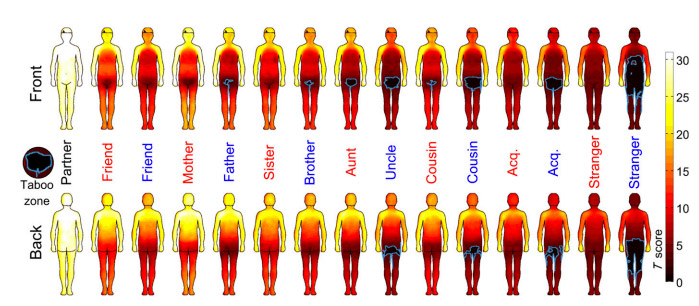
Ever wonder whether you should shake someone’s hand or hug them? Oxford University now has the answer.
The British university, in conjunction with Finland’s Aalto University, conducted the largest study on physical contact ever and found that—surprise!—people don’t really want to be touched by strangers anywhere except their hands. But they did find that women are more comfortable with physical contact than men.
The researchers polled of over 1300 men and women in five different countries (Britain, Finland, France, Italy and Russia) about where they felt comfortable being touched by partners, friends of the same and opposite sex, family members and strangers. Their responses were distilled into a map that shows which areas are (literally) up for grabs and which are off limits. The results were published in journal PNAS this week.
The graphic shows the obvious: genitals are a taboo zones, people of both genders are more comfortable with physical contact with their mothers than their fathers. But the study also found odd tidbits: Italians are more comfortable being touched than Russians, for instance. Finns proved the most comfortable with contact and Brits the least.
The research also determined that when it came to touching, nominal relationships (like whether someone was a blood relative) mattered more than the frequency with which people encountered one another. “It is the relationship rather than familiarity that matters. A friend we haven’t seen for some time will still be able to touch areas where an acquaintance we see every day would not,” Oxford University’s Professor Dunbar explains on Oxford’s website.
5 Horrible Habits You Need to Stop Right Now





More Must-Reads from TIME
- Why Biden Dropped Out
- Ukraine’s Plan to Survive Trump
- The Rise of a New Kind of Parenting Guru
- The Chaos and Commotion of the RNC in Photos
- Why We All Have a Stake in Twisters’ Success
- 8 Eating Habits That Actually Improve Your Sleep
- Welcome to the Noah Lyles Olympics
- Get Our Paris Olympics Newsletter in Your Inbox
Write to Eliana Dockterman at eliana.dockterman@time.com